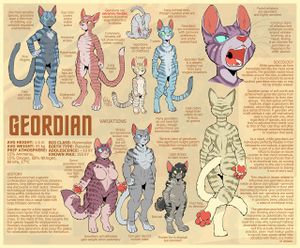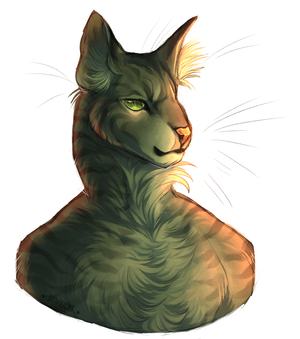Geordian: Difference between revisions
Rick Griffin (talk | contribs) No edit summary |
Rick Griffin (talk | contribs) No edit summary |
||
| Line 3: | Line 3: | ||
[[Category:Species in Hayven Celestia]] |
[[Category:Species in Hayven Celestia]] |
||
== Religion == |
== Religion == |
||
Geordian "religion" is, like |
Geordian "religion" is, like for many species, a matter of cultural identity more than dogma. And the current geordian cultural identity revolves around a simple fact: that once they had an extremely powerful, idealized Confederation which has for several thousand years been suppressed by the krakun. |
||
===''Aa'dato'' and ''Anakosa''=== |
===''Aa'dato'' and ''Anakosa''=== |
||
These two words can be translated, with some accuracy, such that ''aa'dato'' = ''heaven'' and ''anakosa'' = ''hell''. In a more accurate sense, however, aa'dato means ''paradise, utopia, Shangri-la, Golden Age'', while anakosa means ''entropy, the cycle of death/violence, the absurdity of the universe''. |
These two words can be translated, with some accuracy, such that ''aa'dato'' = ''heaven'' and ''anakosa'' = ''hell''. In a more accurate sense, however, aa'dato means ''paradise, utopia, Shangri-la, Golden Age'', while anakosa means ''entropy, the cycle of death/violence, the absurdity of the universe''. |
||
Revision as of 11:18, 6 September 2024
Religion
Geordian "religion" is, like for many species, a matter of cultural identity more than dogma. And the current geordian cultural identity revolves around a simple fact: that once they had an extremely powerful, idealized Confederation which has for several thousand years been suppressed by the krakun.
Aa'dato and Anakosa
These two words can be translated, with some accuracy, such that aa'dato = heaven and anakosa = hell. In a more accurate sense, however, aa'dato means paradise, utopia, Shangri-la, Golden Age, while anakosa means entropy, the cycle of death/violence, the absurdity of the universe. Specifically, Aa'dato refers to the center of geordian culture during the height of the Confederation. It has since moved on into legend, spoken of as though it were literally the greatest place in the universe anyone could possibly create--where peace reigned and nobody was left wanting. To many georidans, the greatest good is to build such a city again, and geordians who made strides in the restoration are considered heroes, who are also spoken of reverently. To many geordians, the purpose of aa'dato is the relief from anakosa.
Anakosa is, in a spiritual sense, the place where all souls go--back to the universe. While geordians do not believe in a direct soul-to-soul reincarnation, they believe that every soul is formed from the same universal fabric, used and reused again and again. There is no escape from this, and so there are only two destinies for the soul--for their next life to end up good, or bad. Thus it is their responsibility to build aa'dato for any and every soul, temporary as it might be, in the hopes that the cycle may one day create more peace than suffering.
Gods and Heroes
Because geordians don't believe in a literal spiritual realm outside the material universe, their concept of gods is largely physical--and not necessarily deserving of reverence or worship. To a gerodian, a god may be anything or anyone that is in such total control over their lives that there is little to no hope of escaping it. Thus, a very powerful king or dictator may be a god, nature is a god, the universe is a god. The only thing they can do is pray for a good (or at least apathetic) god over a bad one.
As such, heroes are much more reverently worshiped. While gods do not necessarily possess virtue, heroes are exemplars of virtue. Heroes rarely gain the status of gods, as they are part of the same cycle of the universe as every other mortal. Thus geordians typically feel more like a peer to the figures they worship than other species might.


